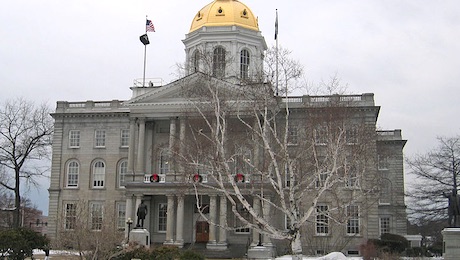By Michael Carroll | Watchdog.org
New Hampshire taxpayers boast the most cost-effective public services in the nation, according to a new study ranking taxpayer return on investments (ROI).
The analysis by WalletHub.com, titled “States with the Best & Worst Taxpayer ROI,” found that the Granite State ranked No. 1 for how much “bang for their buck” taxpayers receive from their public services and seventh for the overall quality of New Hampshire’s public services. These services deal with public education, infrastructure and pollution, public safety and the state’s health care system.
“New Hampshire residents get the most bang for their buck,” WalletHub analyst Jill Gonzalez said in an email. “This is because they pay the second lowest taxes, about $2,300 per capita, while at the same time benefiting from high-quality public services.”

New Hampshire Statehouse in Concord
The WalletHub study includes two data tables, one rating the 50 states on their public services and the other comparing the quality of public services to the per-capita state and local levies that residents pay in each state.
“Though some states have high-quality government services, their taxpayer ROI might be lower, as taxation is high as well,” Gonzalez said.
New Hampshire has the fourth best public school system in the nation and the third lowest rate of violent crime, according to the study, which found that the state also fares well on economic issues.
“It has the lowest share of residents living below the poverty line, 8.1 percent, and the lowest unemployment rate, 2.5 percent,” Gonzalez said.
Quality-of-life criteria and the general health of its residents are also ranked highly in the analysis.
“Both its school and health care systems are some of the best in the country,” she said. “As direct consequences, the state’s share of idle youth is one of the lowest, and New Hampshire has one of the highest life expectancies, along with the fourth lowest infant mortality rate.”
Overall, red or Republican-leaning states tended to get a better ROI rank compared to blue or Democrat-leaning states, WalletHub reported. Collectively, red states ranked 21.2, while blue states as a group tended to finish lower on the list, at 31.95.
Andrew Cline, president of the Josiah Bartlett Center for Public Policy in Concord, said the state has historically emphasized frugality and taxpayer value when providing public services to its residents.
“In general the culture values self-reliance,” Cline said in an email. “That makes it possible for government to play a smaller role in people’s lives. That government should be frugal and not become too much of a burden on the people is a pretty widely held belief here.”
So it wasn’t a big surprise that New Hampshire scored highly on the WalletHub analysis examining taxpayer ROI, he said.
“At the state and local levels, the measure of success is seldom how much taxpayer money can be spent, but how well it can be spent,” Cline said. “Fiscally, this has helped keep the state in very good shape.”
In a blog post on the Bartlett Center’s website, Cline expressed a few concerns with WalletHub’s methodology, however. Because hospitals tend to be private-sector entities, their missions are not a good measurement of public spending, he said.
“And the research on pre-school ‘education’ shows overwhelmingly that it doesn’t produce long-term educational advantages for students, so pre-school spending is a bad measure of ROI,” Cline said. “But a lot of WalletHub’s measures were sensible.”
State lawmakers who have voted to increase taxes and public spending during the current legislative session would do well to shift their approach and focus on policy outputs rather than inputs, he said.
The New Hampshire Fiscal Policy Institute’s annual conference earlier this year highlighted some concerns that point to future challenges to the state’s fiscal health.
Though the yearly median household income in the state is about $73,000, about 20 percent of households earn under $35,000, according to institute policy analyst Phil Sletten.
“While the economy has grown and helped increase median household income, there are still many people with very limited means,” Sletten said during the conference.
In addition, the state is experiencing a worker shortage due to low unemployment, difficulties maintaining its infrastructure and a lack of affordability in both housing and higher education, according to Jeffrey Thompson, director of the New England Public Policy Center.
“Being able to attract and retain younger workers will prove crucial to [New England] economies as well as their ability to finance vital public goods and services,” Thompson said during the conference.



See my video link I posted in the TNR article:
VT-What is ‘moral’ government?
http://truenorthreports.com/what-is-moral-government
This is what’s going on in VT as have in CO.
Why the folks in the bubble don’t look over the river to see how well things are going there, and how well the government is run was beyond me when I lived in VT. Instead the folks in the bubble continue to try to fit a square nail in a round hole.
They continue to do so at the expense of the hard working folks in VT. Sad
Having a neighbor such as Vermont showing N H just how Not to do things has been a help to them and they have been right there to capture that business and industry from the Canadian to the MA border. They are sensitive to the affordability factor taxpayers endure, and I believe are better managers and custodians of taxpayer funds. Just came aross Maine and New Hampshire this week, and both states are booming economically. Talked with a long time business owner in Wells Maine, he says it is great to see things so busy, the economy booming and the working guy having a little money to spend. Pretty basic stuff, but it is working and guess what: THE PROGRESSIVES ARE NOT IN CHARGE!!!
How about them apples?